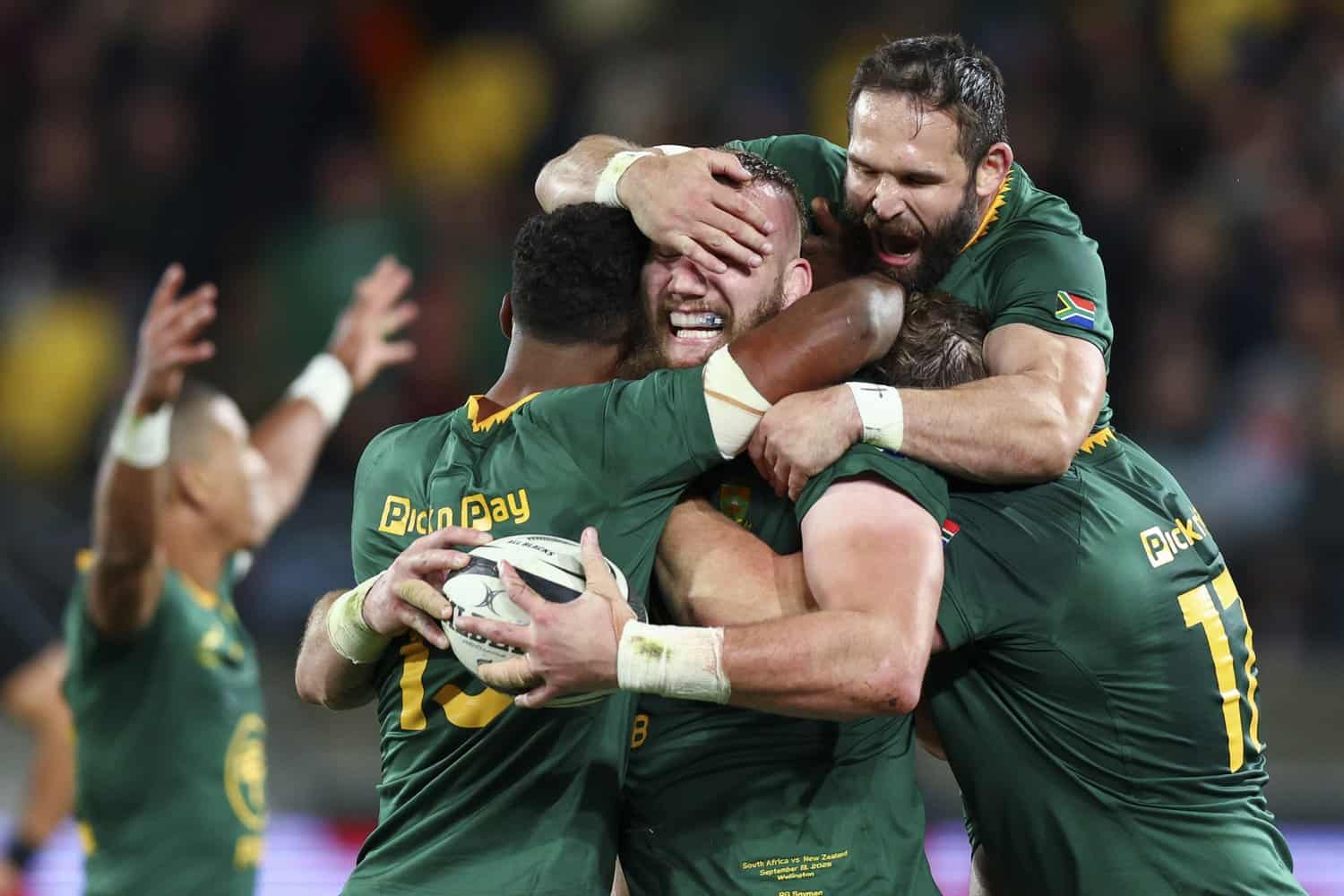In the afterglow of Wellington, it is hard to escape the sense that the Rugby Championship 2025 has tilted toward South Africa. The Springboks did not just beat the All Blacks, they dismantled them 43-10, the biggest defeat in New Zealand’s history and the Boks’ largest winning margin over their greatest rivals. It was a result that reverberated far beyond the Cake Tin, yet within the camp there is deliberate calm and a reminder that nothing is won in September.
Rassie Erasmus set that tone with admirable restraint. He praised the effort, but returned repeatedly to the same theme, that the job is not done. It is a long season, the margins are tiny, and as he put it, there is still everything to play for. Australia are top of the log on 11 points, helped by a late try in their 28-26 loss to Argentina that yielded two losing bonus points, South Africa and New Zealand sit on 10, with the Boks ahead on points difference, and Argentina are one back on 9.
That thin edge is why the Springbok coach kept the celebrations controlled. We have achieved nothing yet, he said in the weekend’s aftermath, and it is hard to argue when one glance at the table shows one point separating first and fourth. Even the method of earning a try bonus in this competition, you must score three more tries than your opponent, makes double-bonus outcomes a rare feat under pressure.
A statement made in Wellington
This performance carried the weight of a manifesto. After trailing 10-7 at halftime, despite a disruptive opening half with injuries and head assessments, the Boks poured in five second half tries, 36 unanswered points, and a blueprint for control. The blend was right, the balance between kicking to pressure and running to punch holes never wavered, and the All Blacks were visibly breathless soon after the interval. That is where the game turned from tight contest to emphatic statement.
Perhaps the most striking insight arrived when Erasmus explained the interval dynamic. The players spoke the most, he revealed, a hint at leadership culture rather than a schematic trick. In a sport where coaches often dominate the narrative, it was the group that steered itself, and they did so with conviction. That detail, as much as any tactical wrinkle, signposts a team that trusts its compass.
There was a human heartbeat to it too. Young Ethan Hooker, on his first start, soaked in the occasion, lauding how the squad “connected and gelled” and reveling in the moment with the Freedom Cup in hand. The night belonged to a wider squad that Erasmus keeps referencing, a 45-strong unit where opportunity meets expectation and where newcomers can surge without fear.
The log, the margins and the run in
The table after four rounds reads like a thriller. Australia on 11, South Africa and New Zealand on 10, Argentina on 9. Each team has two wins and two losses, each has stumbled at home, and the arithmetic of bonus points has become the thin thread that separates hope from heartbreak. A contentious late moment in Sydney, described as a dubious call in one report, allowed the Wallabies a try that secured a crucial bonus and kept them slightly out in front.
Upcoming fixtures intensify the puzzle. New Zealand and Australia meet twice, starting at Eden Park, a place of comfort for the hosts but, after Wellington, one that will carry a hint of uncertainty. It is difficult to envision either side taking two wins with try bonuses, which deepens the impression that South Africa’s duel with Argentina will define this title race. The Boks look well placed, but the caution is real, because Los Pumas have shown they can punch through the script.
The twist is venue. Argentina have given up home advantage for the final match, agreeing to play South Africa at Twickenham. As one analysis put it, London is likely to be the decider, and, in that setting, the weight tilts toward the Boks. A fervent expatriate crowd, memories of a 35-7 win over New Zealand there in 2023, and a recent love affair with the stadium, all suggest comfort in neutral territory. Context matters, of course, but the familiarity is undeniable.
Why South Africa look like the favourites
To say Wellington came out of nowhere ignores a longer arc. Since 2022 there have been clear windows into what this team can be at full clip. Think of Mbombela, a 26-10 win that might have been greater, where South Africa’s physical control and chance creation were already evident. Consider Twickenham 2023, a 35-7 pre World Cup dismantling of the All Blacks that, even with caveats, underlined a massive gap on that night between the rivals.
There have been blips, which only sharpens the current edge. A fast start and then a hard lesson against Australia in Johannesburg, when the Boks raced 22-0 ahead before conceding 38 unanswered points, remains a reference point for what happens when tempo outruns clarity. A week later at Eden Park, there were stretches where South Africa won the collisions yet conspired against themselves, the kind of mixed picture that kept forecasts cautious heading into Wellington.
Enter Tony Brown, and with him a broader attacking canvas. Call it Tonyball if you like, the idea is not to trade physical identity for flourish, but to layer variety and decision making onto a bruising frame. Wellington felt like the longest, most complete look at that ambition. The Boks kicked smartly, ran with intent, and kept their spacing and support intact, which meant the ball lived where they wanted it and New Zealand were pulled out of rhythm. That is why the performance reads as a process milestone rather than a one off.
Humility, perspective and the psychology of the rivalry
Erasmus has walked through defeat, which colored his empathy in victory. He acknowledged the scale of the scoreline while resisting the temptation to make it the story. New Zealand, he noted, had eight players with fewer than 10 caps in their squad, and they will regroup quickly. He also pointed to a 24 hour job of managing belief in the age of social media, a frank admission that confidence now needs constant care.
The mutual respect remains the spine of this rivalry. South Africa know the pain of a 57-0 defeat in Albany in 2017. The All Blacks know the sting of Twickenham 2023 and now Wellington 2025. The personal humility on display from the Bok coach after this result, and the refusal to crow, is more than etiquette. It is an understanding that the ground can shift under your feet if you stop paying attention for a week.
Injuries, selections and the next steps
There are practical concerns before Argentina arrive in Durban for the 27 September clash. Erasmus flagged serious looking knocks for Lood de Jager and Aphelele Fassi, and Fassi left Wellington in a moon boot. That could force a backline reshuffle at Hollywoodbets Kings Park, perhaps moving Damian Willemse from inside centre, the role in which he was man of the match, to fill a gap elsewhere.
The wider selection picture is layered. The group that delivered in Wellington had limited combined Test experience in some areas, yet they were incisive and composed. The veterans left out remain in the 45 man conversation, which creates a healthy tension heading into the Argentina Tests. Continuity may serve the new combinations, but experience might be invaluable if the Twickenham finale becomes a title decider.
The schedule offers a micro window to breathe. The Boks flew home on Sunday, will regroup in Durban on Thursday, and will then pivot into tactical detail for the Pumas. Erasmus has been clear that Argentina are well drilled, and that their review of South Africa’s scrums, lineouts and attack will be forensic. There will be no surprises about the intensity to come.
The Argentina factor
Los Pumas sit at the foot of the table, but only by a point, and their recent 28-26 win in Sydney underscores their capacity to seize moments. They are a wildcard in the best sense, unpredictable, awkward, and threatening from broken field. Consistency is their challenge, which is why predicting their ceiling over two weeks is so difficult.
Durban suits the Boks, and Twickenham, while neutral, has its own South African atmosphere and history. There is a wrinkle that adds nuance, many of Argentina’s players are Europe based, so the London climate and rhythm will feel familiar. If the race goes down to the last eighty minutes, the Pumas are unlikely to be daunted by the setting.
The Eden Park subplot
While South Africa wrestle with Argentina, the All Blacks and Wallabies will be chasing their own momentum. Eden Park has long been a fortress for New Zealand, yet the scale of the Wellington defeat introduces new pressure. It is difficult to imagine a two match sweep with try bonuses for either side, which is why many analysts see South Africa’s destiny as largely in their own hands if they pass the Argentina test.
There is a historical echo here. The Bledisloe battles often shape the Championship narrative, but this year, balance across the four teams has been the theme. Each has lost at home, each has taken turns surging and stumbling, and small moments, like a forward pass call in Sydney or a fumble in a try zone, have outsized impact on the table.
What will decide the title
The Boks have the clearest path, win twice and you probably lift the trophy, especially if the trans Tasman rivals split their series. Beyond the table math, three forces look decisive, and all three were in sharp focus in Wellington.
- Game balance, the ability to mix pressure kicking with sharp phase play without losing defensive shape,
- set piece clarity, a stable scrum and accurate lineout that feed momentum and close off cheap penalties,
- composure under stress, the leadership to self correct in game and turn swings into sustained control.
Each of those pillars has a human layer. Balance is practiced, but it is also felt in the 50-50 choices that halves must make under fatigue. Set piece precision lives in detail and in the trust between lifters, jumpers and hooker. Composure is cultivated in training, but it is proven when a halftime huddle needs more player voices than coach instruction, as it did in Wellington.
What the win means, and what it does not
South Africa’s 43-10 is a seismic score, yet Erasmus is right that it is not a trophy. The modern All Blacks have absorbed dents to their aura since 2019, from an Ireland series defeat to losses home and away to Argentina, but they remain a heavyweight that usually responds swiftly. The Boks know this better than anyone, because they have been on both sides of these swings across the last decade.
What the win does deliver is a credible claim to leadership in this Championship. It validates the direction of the attack under Tony Brown, it stretches the depth chart, and it strengthens belief at a time when belief can wobble as quickly as a timeline trends. It also reframes pressure. Now South Africa must show they have shed complacency, the very lesson Johannesburg tried to teach a month ago.
Verdict on the race
It is down to the wire, and that is exactly how it should be. The Wallabies have taken strides, the All Blacks are wounded and dangerous, the Pumas are bristling and bold, and the Springboks look like a champion side finding a more expansive gear. The likely decider at Twickenham feels like a fitting stage, equal parts neutral and familiar.
South Africa are favourites because they earned the right to be, not because the table has already crowned them. They will need to match the intensity of Wellington with the patience of a team that knows how titles are closed, not chased. Do that, ride the wave without getting carried away by it, and the season could end in a back to back Championship, a feat the Boks have yet to achieve in their history.
Until then, the mantra holds, achieved nothing yet. It is measured, it is mature, and given how thin the margins are, it is exactly the tone a contender needs.





